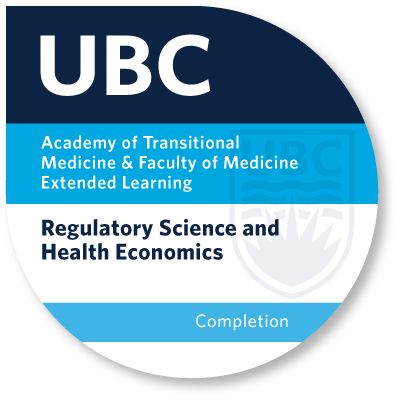- Hybrid
- $1,300 - $2,600
This is the second of two courses in the UBC Micro-certificate in Regulatory Affairs in the Life Sciences.
While regulatory affairs is concerned with the administrative and legal aspects of regulations, regulatory science focuses on the tools and approaches used to assess the safety, efficacy, value and performance of health products. Regulatory science provides the scientific underpinnings of regulations, and helps regulators understand and assess risk and risk-benefit trade-offs.
Developed by the UBC Faculty of Medicine, and the UBC Academy of Translational Medicine’s Regulatory Advisory Council, this five-week course explores this emerging discipline, as well as patent regulations, post-market surveillance and regulatory reforms.
By the end of this course, you’ll be able to:
- describe patent law and regulations and their impact on healthcare
- outline post-market regulatory surveillance requirements, including understanding regulatory determinations of what constitutes “substantial evidence”
- explain trends in clinical studies, including the use of basket trials and adaptive clinical trial design
- describe the elements of real-world evidence generation, pharmacoeconomics and health economic evaluation
- understand socio-economic considerations, including methods for eliciting patients and risk-benefit trade-offs.
Course outline
Module 1: Patent Regulation: Societal Impact and Regulatory Reform
Learn about patent regulation and its impact on society, including proposed regulatory reforms and why they failed in Canada.
Module 2: Regulatory Post-market Surveillance and Defining Evidence Standards
Regulators are increasingly relying on conditional regulatory pathways to authorize new health technologies based on clinical trials with insufficient patient numbers and non-randomised study designs. In this module, learn about conditional drug authorizations, evidence standards and regulatory reform.
Module 3: Master Protocols
Learn about trends in clinical trial design, including the increasing use of master protocol frameworks based on basket trials, umbrella trials and adaptive clinical trials.
Module 4: Real World Evidence and Health Economics
The greater personalization of healthcare products means that evidence generation is challenged by small benefitting populations, non-traditional approaches to healthcare, and the need for quick evidence to support decision-making. Regulatory and reimbursement decisions are concerned with trade-offs between patented prices for health products and the benefit to patients they create. In this module, learn about the use of health economic evaluation and real-world evidence to understand efficacy and value for money.
Module 5: Socio-economics and Patient Preferences: Overview and Methods
Regulators make decisions that influence individual patient and public health. Increasingly, regulators in Canada and around the world are examining how patient and public preferences can be used in regulatory and reimbursement decisions. Learn the steps of patient engagement, including how to elicit and quantify risk-benefit trade-offs. Week 5 includes a workshop in lieu of an online class in which we examine the case study of NTRK+ Fusions, and its implementation in healthcare systems.
How am I assessed?
You’re assessed on your proficiency in core competencies you demonstrate in an assignment and weekly reflections on course content, as well as your participation in live online sessions, online discussion forums, and the workshop.
Students are expected to articulate three point-form reflections on the core concepts learned during each weekly lecture. Reflections are graded out of six marks total, and contribute to the final grade.
During week 3, students will be given an assignment with a mixture of multiple choice and short answer questions to test their knowledge on the first three weeks of the course.
The workshop features a final case study assignment designed to demonstrate how you would apply your regulatory skills.
Your work is marked on a matrix using a scoring guide, and your instructor provides you specific and actionable feedback.
Learner evaluation
Class reflections and student participation: 30%
Assignment: 30%
Workshop Project: 40%
The course is pass/fail. You must achieve an overall grade of 70% or greater to pass and earn a micro-certificate.
Expected effort
Expect to spend 5−7 hours a week completing all learning activities, including attending the live online sessions and the workshop.
Technology requirements
To take this course, you’ll need access to:
- an email account
- a computer, laptop or tablet
- the latest version of a web browser (or previous major version release)
- a reliable internet connection
- a video camera and microphone.
Course format
This part-time blended program is instructor-supported and combines weekly facilitated live and pre-recorded online sessions, self-paced independent study, and an in-person workshop. A virtual option using Zoom is available for the workshop so you can complete the program entirely online.
In the fifth and final week of the course, in place of the online class you attend an in-person workshop in Vancouver. The live online sessions will also be recorded. Please see Available sessions below for current offering dates and in-house workshop date and time. Students can check the course schedule in canvas to learn of any changes to the day and time of the live online sessions and in-person workshop
Outside of class time, you can access online materials at your own pace. Each week, review readings, videos and podcasts. Contribute to an online forum where you can apply your learning.
One business day before the course start date, we’ll email you step-by-step instructions for accessing your course.
